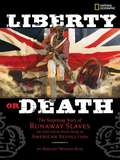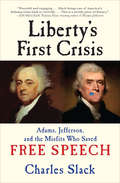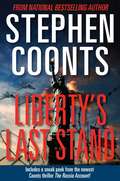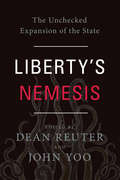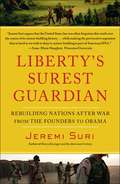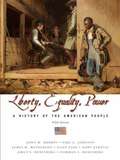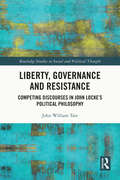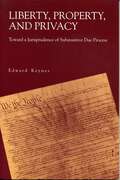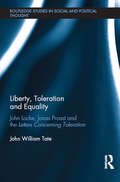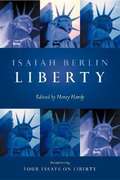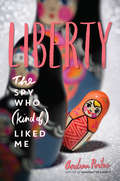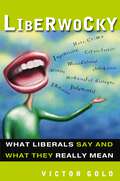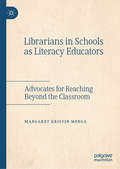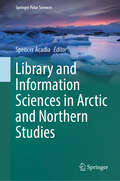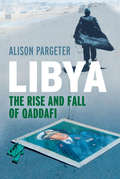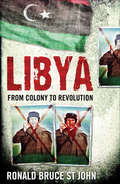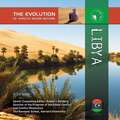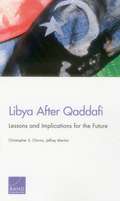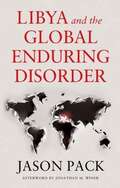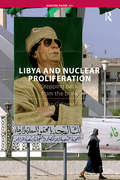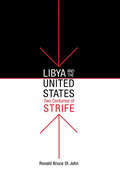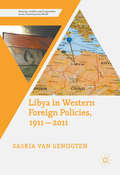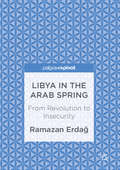- Table View
- List View
Liberty or Death: The Surprising Story of Runaway Slaves Who Sided with the British During the American Revolution
by Margaret Whitman BlairLiberty or Death is the little-known story of the American Revolution told from the perspectives of the African-American slaves who fought on the side of the British Royal Army in exchange for a promise of freedom. Motivated by the 1775 proclamation by Virginia’s Royal Governor that any slaves who took up arms on his behalf would be granted their freedom, these men fought bravely for a losing cause. Many of the volunteers succumbed to battle wounds or smallpox, which ran rampant on the British ships on which they were quartered. After the successful Revolution, they emigrated to Canada and, ultimately to West Africa. Liberty or Death is the inspiring story of the forgotten freedom fighters of America’s Revolutionary War.
Liberty's First Crisis: Adams, Jefferson, and the Misfits Who Saved Free Speech
by Charles SlackWhen the United States government passed the Bill of Rights in 1791, its uncompromising protection of speech and of the press were unlike anything the world had ever seen before. But by 1798, the once-dazzling young republic of the United States was on the verge of collapse: partisanship gripped the weak federal government, British seizures threatened American goods and men on the high seas, and war with France seemed imminent as its own democratic revolution deteriorated into terror. Suddenly, the First Amendment, which protected harsh commentary of the weak government, no longer seemed as practical. So that July, President John Adams and the Federalists in control of Congress passed an extreme piece of legislation that made criticism of the government and its leaders a crime punishable by heavy fines and jail time. In Liberty’s First Crisis, writer Charles Slack tells the story of the 1798 Sedition Act, the crucial moment when high ideals met real-world politics and the country’s future hung in the balance.From a loudmouth in a bar to a firebrand politician to Benjamin Franklin’s own grandson, those victimized by the Sedition Act were as varied as the country’s citizenry. But Americans refused to let their freedoms be so easily dismissed: they penned fiery editorials, signed petitions, and raised "liberty poles,” while Vice President Thomas Jefferson and James Madison drew up the infamous Kentucky and Virginia Resolutions, arguing that the Federalist government had gone one step too far. Liberty’s First Crisis vividly unfolds these pivotal events in the early life of the republic, as the Founding Fathers struggled to define America off the page and preserve the freedoms they had fought so hard to create.
Liberty's Last Stand (Tommy Carmellini Ser. #7)
by Stephen CoontsNew York Times bestselling author Stephen Coonts delivers another nail-biting thriller starring CIA Director Jake Grafton and his right-hand man, Tommy Carmellini. The president of the United States stands on an outdoor stage, flanked by powerful members of his administration and party. Television crews are preparing for broadcast. High above the stage, on a nearby rooftop, a decorated sniper adjusts the scope on his rifle.Afterwards, America will never be the same.Jake Grafton and Tommy Carmellini suddenly find themselves on the wrong side of the law when a public act of violence throws the country into chaos just before a presidential election. After martial law is declared and rioting begins, Grafton and Carmellini must risk everything to unravel a massive conspiracy and help a new resistance movement rise up against an unimaginable enemy...
Liberty's Nemesis
by John Yoo Dean ReuterIf there has been a unifying theme of Barack Obama's presidency, it is the inexorable growth of the administrative state. Its expansion has followed a pattern: First, expand federal powers beyond their constitutional limits. Second, delegate those powers to agencies and away from elected politicians in Congress. Third, insulate civil servants from politics and accountability. Since its introduction in American life by Woodrow Wilson in the 20th Century, the administrative state's has steadily undermined democratic self-government, reduced the sphere of individual liberty, and burdened the free market and economic growth.In Liberty's Nemesis, Dean Reuter and John Yoo collect the brightest political minds in the country to expose this explosive, unchecked growth of power in government agencies ranging from health care to climate change, financial markets to immigration, and more. Many Americans have rightly shared the Founders' fear of excessive lawmaking, but Liberty's Nemesis is the first book to explain why the concentration of power in administrative agencies in particular is the greatest - and most overlooked - threat to our liberties today.If we fail to curb it, our constitutional republic might easily devolve into something akin to the statist governments of Europe. President Obama's ongoing efforts to encourage just such a devolution, and the problems his administration faces as a consequence, present a critical opportunity to defend the original vision of the Constitution.
Liberty's Surest Guardian
by Jeremi SuriAmericans are a nation-building people, and in Liberty's Surest Guardian, Jeremi Suri--Nobel Fellow and leading light in the next generation of policy makers--looks to America's history to see both what it has to offer failed states around the world and what it should avoid. Far from being cold imperialists, Americans have earnestly attempted to export their invention of representative government. We have had successes (Reconstruction after the American Civil War, the Philippines, Western Europe) and failures (Vietnam), and we can learn a good deal from both. Nation-building is in America's DNA. It dates back to the days of the American Revolution, when the founding fathers invented the concept of popular sovereignty--the idea that you cannot have a national government without a collective will. The framers of the Constitution initiated a policy of cautious nation-building, hoping not to conquer other countries, but to build a world of stable, self-governed societies that would support America's way of life. Yetno other country has created more problems for itself and for others by intervening in distant lands and pursuing impractical changes. Nation-building can work only when local citizens "own it," and do not feel it is forced upon them. There is no one way to spread this idea successfully, but Suri has mined more than two hundred years of American policy in order to explain the five "P"s of nation-building: PARTNERS: Nation-building always requires partners; there must be communication between people on the ground and people in distant government offices. PROCESS: Human societies do not follow formulas. Nation-building is a process which does not produce clear, quick results. PROBLEM-SOLVING: Leadership must start small, addressing basic problems. Public trust during a period of occupation emerges from the fulfillment of basic needs. PURPOSE: Small beginnings must serve larger purposes. Citizens must see the value in what they're doing. PEOPLE: Nation-building is about people. Large forces do not move history. People move history. Our actions in Iraq, Afghanistan, and Libya will have a dramatic impact on international stability. Jeremi Suri, provocative historian and one of Smithsonian magazine's "Top Young Innovators," takes on the idea of American exceptionalism and turns it into a playbook for President Obama over the next, vital few years.
Liberty's Surest Guardian: American Nation-Building from the Founders to Obama
by Jeremi SuriAmericans are a nation-building people, and in Liberty's Surest Guardian, Jeremi Suri--Nobel Fellow and leading light in the next generation of policy makers--looks to America's history to see both what it has to offer failed states around the world and what it should avoid. Far from being cold imperialists, Americans have earnestly attempted to export their invention of representative government. We have had successes (Reconstruction after the American Civil War, the Philippines, Western Europe) and failures (Vietnam), and we can learn a good deal from both. Nation-building is in America's DNA. It dates back to the days of the American Revolution, when the founding fathers invented the concept of popular sovereignty--the idea that you cannot have a national government without a collective will. The framers of the Constitution initiated a policy of cautious nation-building, hoping not to conquer other countries, but to build a world of stable, self-governed societies that would support America's way of life. Yetno other country has created more problems for itself and for others by intervening in distant lands and pursuing impractical changes. Nation-building can work only when local citizens "own it," and do not feel it is forced upon them. There is no one way to spread this idea successfully, but Suri has mined more than two hundred years of American policy in order to explain the five "P"s of nation-building: PARTNERS: Nation-building always requires partners; there must be communication between people on the ground and people in distant government offices. PROCESS: Human societies do not follow formulas. Nation-building is a process which does not produce clear, quick results. PROBLEM-SOLVING: Leadership must start small, addressing basic problems. Public trust during a period of occupation emerges from the fulfillment of basic needs. PURPOSE: Small beginnings must serve larger purposes. Citizens must see the value in what they're doing. PEOPLE: Nation-building is about people. Large forces do not move history. People move history. Our actions in Iraq, Afghanistan, and Libya will have a dramatic impact on international stability. Jeremi Suri, provocative historian and one of Smithsonian magazine's "Top Young Innovators," takes on the idea of American exceptionalism and turns it into a playbook for President Obama over the next, vital few years.
Liberty, Equality, Power: A History of the American People
by James M. Mcpherson Gary Gerstle Emily S. Rosenberg Norman L. Rosenberg John M. Murrin Alice Fahs Paul E. JohnsonIntegrating social and cultural history, this college textbook tells the political story of a country that, over a relatively brief period, transformed itself into the most powerful nation on earth, and explores the role of power in shaping American politics, society, and economics. The fifth edition adds a final chapter on Presidents Clinton and Bush. Annotation ©2007 Book News, Inc., Portland, OR (booknews.com)
Liberty, Equality, Power: A History of the American People
by James M. Mcpherson Gary Gerstle Emily S. Rosenberg Norman L. Rosenberg John M. Murrin Alice Fahs Paul E. JohnsonThis is Volume I (to 1865) of LIBERTY, EQUALITY, POWER: A HISTORY OF THE AMERICAN PEOPLE, CONCISE EDITION, Third Edition. LIBERTY, EQUALITY, POWER: A HISTORY OF THE AMERICAN PEOPLE, CONCISE EDITION provides students with a clear understanding of how power is gained, lost, and used in both public and private life. The Third Edition of this concise version retains the narrative clarity, unparalleled coverage, and thematic unity of the larger text while fashioning an unmatched integration of social and cultural history into a political story. The concise version's emphasis on clarity and brevity provides a leaner and clearer presentation for introductory American history students. It retains the same strong chronological and thematic framework as the larger text, but offers a more manageable option for instructors concerned about having too much material and too little time. LIBERTY, EQUALITY, POWER: A HISTORY OF THE AMERICAN PEOPLE, CONCISE EDITION is available in the following volume splits: Liberty, Equality, Power: A History of the American People, Concise Edition (Chapters 1-31), ISBN: 053426462X; Liberty, Equality, Power: A History of the American People, Volume 1: To 1877, Concise Edition (Chapters 1-17), ISBN: 0534264638; Liberty, Equality, Power: A History of the American People, Volume II: Since 1863, Concise Edition (Chapters 17-31), ISBN: 0534264646.
Liberty, Governance and Resistance: Competing Discourses in John Locke’s Political Philosophy (Routledge Studies in Social and Political Thought)
by John William TateJohn Locke is widely perceived as a foundational figure within the liberal tradition. This book investigates the competing discourses that inform Locke’s political philosophy, each underwritten by a distinct purpose, not all of which result in philosophical outcomes consistent with what we today understand as “liberal” ideals.Locke himself was unaware that he belonged to a “liberal” tradition. Traditions only acquire meaning in retrospect. But many have perceived the development of Locke’s political philosophy as involving a smooth evolution from “authoritarian” origins to “liberal” conclusions, beginning with Locke’s Two Tracts on Government (1660–62) and culminating in his later political works, the Two Treatises of Government (1689) and A Letter Concerning Toleration (1689). This book advances an interpretation of this development which reveals how, from the time of his earliest writings, Locke sought to advance competing discourses within his political philosophy, each reflecting a different purpose, with the result that this “evolution” was not as smooth as often supposed. Indeed, many of Locke’s earlier commitments and purposes remained in his later political writings. The result is a much more complex and variegated understanding of Locke’s political philosophy than hitherto supposed within the Locke literature.Liberty, Governance and Resistance will be of interest to students and researchers studying Locke, liberalism, and the history of ideas.
Liberty, Property, and Privacy: Toward a Jurisprudence of Substantive Due Process (G - Reference, Information and Interdisciplinary Subjects)
by Edward KeynesIn this book, Edward Keynes examines the fundamental-rights philosophy and jurisprudence that affords constitutional protection to unenumerated liberty, property, and privacy rights. He is critical of the failure of the U.S. Supreme Court to adopt a coherent theory for identifying which rights are to be considered fundamental and how these private rights are to be balanced against the public interests that the government has a duty to articulate and promote. Keynes develops his argument by first surveying how substantive due process grew out of the tradition of Anglo-American jurisprudence and came to evolve over time. He pays special attention to the shift in its application early in the twentieth century, from protecting "liberty of contract" against economic regulation to protecting "privacy" and other noneconomic rights (as in Roe v. Wade) against social regulation.
Liberty, Toleration and Equality: John Locke, Jonas Proast and the Letters Concerning Toleration (Routledge Studies in Social and Political Thought)
by John William TateThe seventeenth century English philosopher, John Locke, is widely recognized as one of the seminal sources of the modern liberal tradition. Liberty, Toleration and Equality examines the development of Locke’s ideal of toleration, from its beginnings, to the culmination of this development in Locke’s fifteen year debate with his great antagonist, the Anglican clergyman, Jonas Proast. Locke, like Proast, was a sincere Christian, but unlike Proast, Locke was able to develop, over time, a perspective on toleration which allowed him to concede liberty to competing views which he, personally, perceived to be "false and absurd". In this respect, Locke sought to affirm what has since become the basic liberal principle that liberty and toleration are most significant when they are accorded to views to which we ourselves are profoundly at odds. John William Tate seeks to show how Locke was able to develop this position on toleration over a long intellectual career. Tate also challenges some of the most prominent contemporary perspectives on Locke, within the academic literature, showing how these fall short of perceiving what is essential to Locke’s position.
Liberty: Incorporating Four Essays on Liberty
by Isaiah BerlinLiberty is a revised and expanded edition of the book that Isaiah Berlin regarded as his most important-Four Essays on Liberty. Edited by Henry Hardy
Liberty: The Spy Who (Kind of) Liked Me
by Andrea PortesThe bestselling author of Anatomy of Misfit and The Fall of Butterflies, Andrea Portes, is back with another irresistible snarky heroine in Liberty. What is a hero? Paige Nolan knows. Edward Raynes, the young man who exposed America’s unconstitutional spying techniques, is a hero, even if half the dum-dums in the country think he’s a traitor. Or Paige's parents, journalists who were captured by terrorists while telling stories of the endangered and oppressed. They were heroes, too. Were. . . or are—no one has ever told Paige if they’re still alive, or dead.Not heroes? Anyone in the government who abandoned her parents, letting them rot somewhere halfway across the world. And certainly not Paige herself, who despite her fluency in five languages and mastery of several obscure martial arts (thanks, Mom!) could do nothing to save them.Couldn’t, that is, until she’s approached by Madden Carter, an undercover operative who gives her a mission—fly to Russia, find Raynes, and discover what other government secrets he’s stockpiled. In exchange, he’ll reopen the case on her missing parents. She’s given a code name and a cover as a foreign exchange student.Who is a hero? Not Paige Nolan, but maybe, just maybe, Liberty is.
Liberwocky: What Liberals Say and What They Really Mean
by Victor GoldLaid out like a dictionary A-to-Z (much like Ambrose Bierce's Devil's Dictionary), Liberwocky takes a close and comedic look at how liberals use and abuse language to manipulate the citizenry and their attitudes. Having forty years of political and media experience, Gold sees through the trickery of today's political rhetoric. And in this book, he exposes their techniques, their verbal twists and devious turns of phrase, in a way that is both provocative and hilarious. Including sections such as: "Truly Stupid Liberal Ideas" (poking fun at the U.N., Peurto Rican statehood, and voting rights for felons) and "The American Liberal's All Time Enemies List" (fifty conservatives liberals love to hate), this book-both mocking and informative-is an enjoyable romp through the language of modern politics.
Librarians in Schools as Literacy Educators: Advocates for Reaching Beyond the Classroom
by Margaret Kristin MergaThis book explores the role that librarians play within schools as literacy leaders. While librarians working in schools are generally perceived as peripheral to the educational experience, they can in fact provide significant support in encouraging children’s literacy and literature learning. As the need for strong functional literacy becomes ever more important, librarians who support literacy are often invaluable in achieving various academic, vocational and social goals. However, this contribution often seems to be overlooked, with funding cuts disproportionately affecting librarians. Building on recent research from Australia, the USA and the UK, the author examines the role that librarians may play as literacy educators in schools in order to make visible their contributions to the school community. In doing so, this book urges for greater recognition and support to school libraries and their staff as valuable members of the school community.
Library and Information Sciences in Arctic and Northern Studies (Springer Polar Sciences)
by Spencer AcadiaThe role of library and information sciences (LIS) in, for, and about Arctic and Northern studies is underexplored. This book examines the intersection of LIS and Arctic/Northern scholarship, research, and study by considering the Arctic and North as a global information-knowledge society; demonstrates practical and applied ways that librarians, archivists, curators, and other information scholars and professionals can participate and have participated in real activities within Arctic and Northern environments; explains how LIS – as a discipline focused on data, information, and knowledge – has a significant role to play in Arctic and Northern endeavours; and emphasises the inter-/multi- disciplinary nature of what are Arctic studies and Northern studies and the placement of LIS into that structure. Even though LIS has historically been overlooked in Northern and Arctic matters, this book suggests that LIS is in a remarkable position to add value to future Arctic/Northern studies. Thisbook is of interest to scientists, researchers, scholars, educators, professionals, and students globally working in Northern and Arctic contexts and/or with Northern and Arctic pursuits in mind.
Libya
by Alison PargeterFor a reader unfamiliar with the history of Libya, Muammar Qaddafi might be mistaken for a character in fiction. His eccentric leadership as the nation's "Brother Leader," his repressive regime, sponsorship of terrorist violence, unique vision of the state, and relentless hold on power all seem implausibly extreme. This riveting book documents the extraordinary reality of Qaddafi's rise and 42-year reign. It also explores the tenacious popular uprising that finally defeated him and the possibilities for Libya as the future unfolds. Alison Pargeter, an author with deep understanding of Libya's history and people, explains what led up to Qaddafi's bloodless coup in 1969 and how he proceeded to translate his highly personalized vision into political, economic, and social policy. She discusses his tight-knit networks, the crises he overcame—including sanctions after the Lockerbie bombing in 1988—as well as his astounding maneuverings in the early 2000s to restore tattered relations with the West. Pargeter provides a thoroughly fascinating analysis of the 2011 revolt and uncovers the full details of Qaddafi's downfall. She concludes by introducing the new power brokers in post-Qaddafi Libya as well as the variety of knotty challenges that now confront them.
Libya
by Ronald Bruce St JohnSkilfully navigating Libya's eventful past, this fully updated edition of Ronald Bruce St John's authoritative work includes an in-depth examination of the 2011 rebellion that finally put an end to over 40 years of Qadaffi's authoritarian rule. From early Greek settlements to the infamous Lockerbie bombing, and from the colonel's astonishing return to the international stage to the events that led to his ousting, this is an essential introduction to this turbulent land on the cusp of Africa and the Middle East.
Libya (The Evolution of Africa's Major Nations)
by Judy HasdayLibya is the third-largest state in Africa by area. Located in North Africa, it has no permanent rivers or streams, as the Sahara Desert covers most of the country. Yet just beneath the land's surface lie huge reserves of oil, which have provided vast wealth for Libya's political elite. Unfortunately, little of this wealth has reached the country's approximately 6 million residents. For more than 40 years, Mu'ammar al-Gadhafi ruled Libya as an authoritarian state. The hostile foreign policies of the controversial leader, including support for international terrorist groups, caused Libya to become politically and economically isolated from the rest of the world during the late 20th century and early 21st century. In February 2011, a civil war began in Libya that resulted in the overthrow of Gadhafi's government--and eventually, the dictator's execution. Today, Libya remains in turmoil politically, as various factions squabble for power in the newly forming government.
Libya After Qaddafi: Lessons and Implications for the Future
by Christopher S. Chivvis Jeffrey MartiniThe 2011 overthrow of Libyan dictator Muammar Qaddafi by internationally backed rebel groups has left Libya's new leaders with a number of post-conflict challenges, including establishing security, building political and administrative institutions, and restarting the economy. This report assesses these challenges, the impact of the limited international role in efforts to overcome them, and possible future roles for the international community.
Libya And The Global Enduring Disorder
by Jason PackWe no longer inhabit a world governed by international coordination, a unified NATO bloc, or an American hegemon. Traditionally, the decline of one empire leads to a restoration in the balance of power, via a struggle among rival systems of order. Yet this dynamic is surprisingly absent today; instead, the superpowers have all, at times, sought to promote what Jason Pack terms the 'Enduring Disorder'. He contends that Libya's ongoing conflict-more so than the civil wars in Yemen, Syria, Venezuela or Ukraine-constitutes the ideal microcosm in which to identify the salient features of this new era of geopolitics. The country's post-Qadhafi trajectory has been molded by the stark absence of coherent international diplomacy; while Libya's incremental implosion has precipitated cross-border contagion, further corroding global institutions and international partnership. Pack draws on over two decades of research in and on Libya and Syria to highlight the Kafkaesque aspects of today's global affairs. He shows how even the threats posed by the Arab Spring, and the Benghazi assassination of US Ambassador J. Christopher Stevens, couldn't occasion a unified Western response. Rather, they have further undercut global collaboration, demonstrating the self-reinforcing nature of the progressively collapsing world order.
Libya and Nuclear Proliferation: Stepping Back from the Brink (Adelphi Ser. #380)
by Wyn Q. BowenThis Adelphi Paper examines the motives behind Libya‘s pursuit of a nuclear weapons capability, from Gadhafi‘s rise to power in 1969 through to the end of 2003. It also assesses the proliferation pathways that the regime followed during this period, including early dependence on Soviet technology and assistance, subsequently relying on technological infusions from the A.Q. Khan network. Wyn Q. Bowen clearly analyzes the decision to give up the quest for nuclear weapons, focusing on the main factors that influenced the Gadhafi regime‘s calculations, including the perceived need to re-engage, both politically and economically, with the international community, particularly the United States. It explores the process of dismantling the nuclear programme and the question of whether Libya constitutes amodel for addressing the challenges posed by other proliferators.
Libya and the United States, Two Centuries of Strife
by Ronald Bruce St JohnDiplomatic relations between the United States and Libya have rarely followed a smooth path. Washington has repeatedly tried and failed to mediate lasting solutions, to prevent recurrent crises, and to secure its own national interests in a region of increasing importance to the United States. Libya and the United States, Two Centuries of Strife provides a unique and up-to-date analysis of U.S.-Libyan relations, assessing within the framework of conventional historical narrative the interaction of the governments and peoples of Libya and the United States over the past two centuries.Drawing on a wide range of new and unfamiliar material, Ronald Bruce St John, an expert with over thirty years of experience in international relations, charts the instances of ignorance, misunderstanding, treachery, and suffering on both sides that have shaped and limited commercial and diplomatic intercourse.St John argues that Cold War strategies resulted in a paradoxical and ambiguous U.S. policy toward Libya during the Idris regime of the 1960s, strategies that contributed to the bankruptcy of that monarchy. Following the Libyan revolution, the U.S. wrongly believed Qaddafi would become an ally in support of U.S. policy to keep Soviet influence and communism out of the region; his failure to do so marked the beginning of an era of political tension and mutual distrust.Libya and the United States, Two Centuries of Strife documents how long-standing policy differences over the Palestinian issue and such terrorist acts as the destruction of the U.S. embassy in Tripoli and the Pan Am explosion over Lockerbie in 1988 resulted in a sharp deterioration of relations. St John contends that the ensuing demonization of Libya and the U.S. policy of confrontation, which has spanned successive administrations in Washington, have ironically often not served American interests in the region but, rather, have facilitated Qaddafi's survival.
Libya in Western Foreign Policies, 1911-2011
by Saskia Van GenugtenLibya has a short, volatile history. Foreignersplayed a significant role in shaping Libya's institutions and policies, and thisbook explores longer term trends in the relations between Libya and the West, placing current developments in their historical context. Throughout history, the globe's mostpowerful actors have regarded Libya as an outlier state of little significance. Libya belonged neither here nor there and never fell under the full protectionof any significant global or regional powerhouse. Libya's weak nationalidentity, its weak institutions and its peripheral position have made itvulnerable to external influences and interventions. As a result, Libyarepeatedly falls prey to foreign powers wanting to flex their muscles. As thisbook narrates, this was the case in 1911, in 2011 and several times in between.
Libya in the Arab Spring
by Ramazan ErdağBy examining Libya's security architecture before and after the North Atlantic Treaty Organization (NATO) intervention in 2011, this book aims to answer three questions. First, what were the security patterns in Libya within the Middle East security complex before the Arab Spring? Second, to what extent did the Arab Spring and the revolution and intervention processes in Libya affect this security architecture? And third, what are the implications of the Libyan revolution and the NATO intervention on regional security and on the security sub-complexes of the Middle East in the post-Arab Spring era? The author addresses these issues by providing a micro-level analysis of amity-enmity patterns, power distribution and external power interests.
